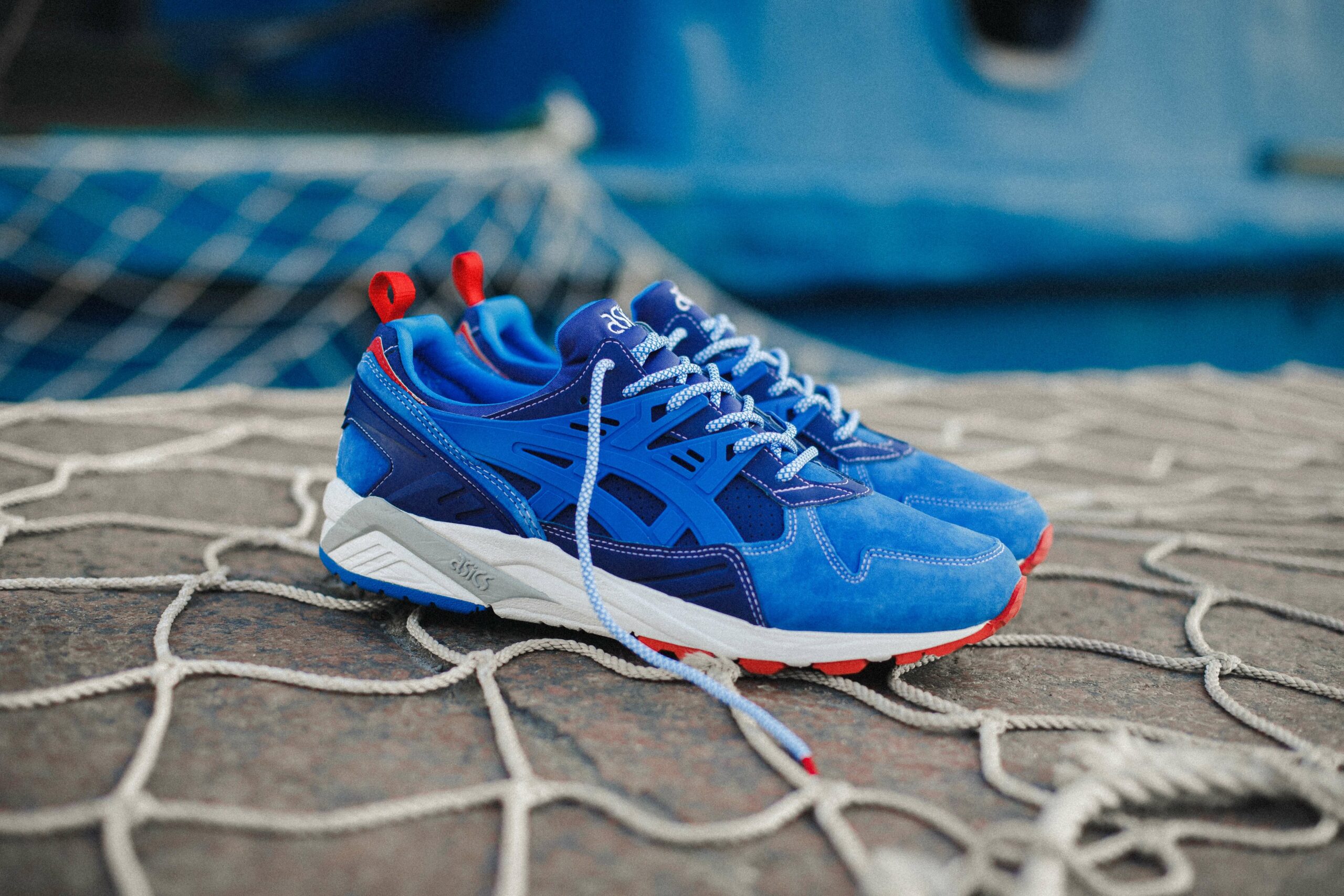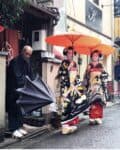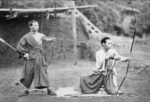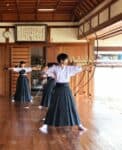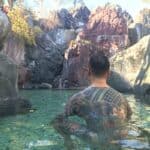When visiting Japan you will probably want to try some of the public baths. Either sento, which are the community bathhouses, or perhaps onsen, which is the term used for hot springs. However, some of these onsens have been known to turn away customers with tattoos.
So can you visit Onsen with tattoos? The good news is that even if you have tattoos you can visit an onsen. It’s not against the law, but some onsen do prohibit people with tattoos, it’s down to the individual bathhouse. There has been a push to change recently as the tourism industry has boomed, with almost half of all onsen permitting entry for people with tattoos – some ask that they be covered, however.
Tattoos are a bit of a tricky subject in Japan. They are highly linked to the Japanese mafia, the yakuza, which is why some establishments have outright banned them. In this article, I’ll tell you how you can still attend the hit springs with ink.
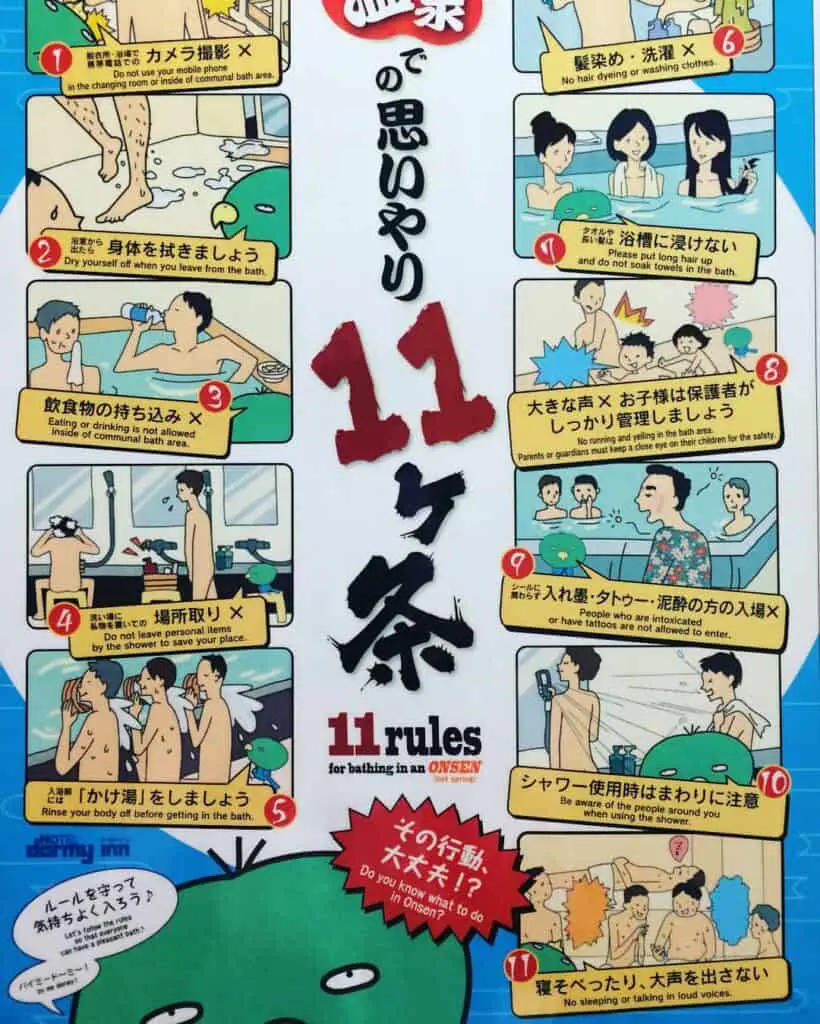

Why Do Some Onsen Refuse People with Tattoos?
Aside from potential links with illegal organizations, in Japan tattoos are thought to be something that anti-social people get. The term for a tattoo in Japan is known as Irezumi and some establishment’s views on this are slightly antiquated.
I would liken it to visible tattoos being frowned upon in professional offices in the western world. While in the modern day it’s becoming more and more accepted, it was only 10 or 20 years ago you would seldom see a tattoo.
Likewise with the Japanese believing that Irezumi was something that anti-social people get, tattoos were something that punks would get to display anti-establishment.
Irezumi has been a part of Japanese culture since the Jomon-Yayoi period, however during the Meiji era the practice was outlawed. It was after this that gangsters would get Irezumi as a way to display their power.
So, as onsen is a service industry, there became a flat ban on tattoos. This is because if a customer wanted to use the onsen and saw someone bathing with a tattoo, that may put them off as that person would be perceived as an anti-social person.
As a way of protecting business interests, and to avoid dealing with gang members, signs started to go up that specified ”those with tattoos will not be allowed in the facility.” This became a flat ban, regardless if you had any links to nefarious organizations.
Now it’s important to make the distinction, you probably aren’t going to alarm someone when you reveal your tattoos. It’s highly unlikely that the Japanese are going to assume a foreigner has ties to the yakuza. However, the fact that you have tattoos can affect where you can visit and what you can do.
Onsen tends to be one of the more common places issues occur, mostly because you are naked while taking onsen. Since you are naked, your tattoos cannot be hidden and you risk offending other bathers. Foreigners will be less likely to offend but that’s not to say it won’t happen.
How to Minimise the Chance of Refusal
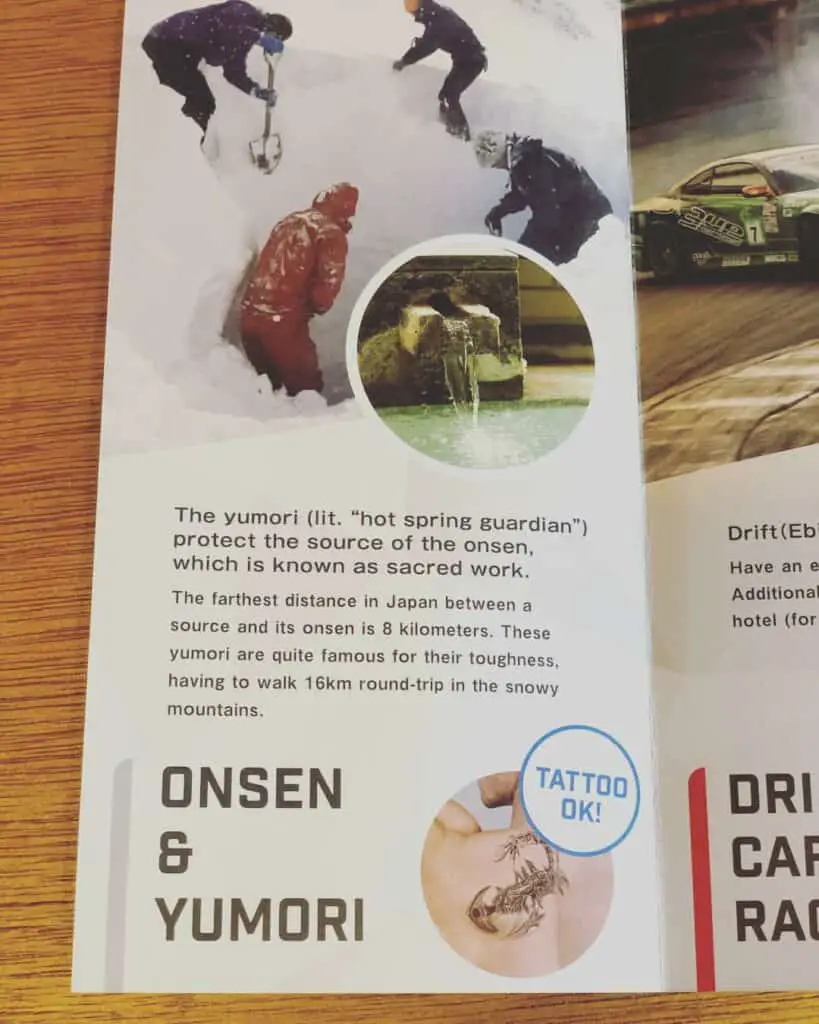
It’s unfair to put the owners of the onsen in a position where they have to refuse or remove the entry. It will be most likely advertised that those with tattoos are not permitted to enter, usually in English as well. So when you visit be sure to look out for these.
The best thing you can do is phone ahead and ask or alternatively ask your hotel concierge for their recommendation. The worst thing that can happen is they decline, but then you can look for somewhere that will accept you.
Some places might not be bothered at all and you will be allowed in with nothing to worry about. Other places may ask for your tattoos to be covered, or you will be asked to rent a private bath.
If you call ahead then the establishment might suggest specific times of the day where it is less busy. They might be more willing to permit entry on these occasions as there will be fewer guests.
Other onsens might supply you with skin-colored patches to cover your tattoos and then you will be allowed through. The main thing that is trying to be avoided is an offense to other bathers, the onsen workers, may not mind whatsoever.
If you are staying at a ryokan (a traditional inn) which has an onsen, then there is likely to be less foot traffic from guests, meaning there will be less risk of someone seeing your tattoo. By reserving a private onsen bath, either at a ryokan or another establishment with the facility, you completely eliminate the chance of your tattoo being seen.
The type of tattoo you have can also play a role in this as well. Something small is much more likely to be permissible than something large.
While the Japanese can be quite mindful of other cultures, it does seem like tattoos are a rather sticky point. Ultimately it is down to the individual but there have been reports of people with traditional tattoos from their own culture being ushered out of onsen.
Will it Become More Accepted?
The good news here is that, yes, as time moves on it’s likely that more onsen will allow tattoos. This is mainly due to the tourism industry which brings in a lot of money. Japan is very good at acknowledging and incorporating modern ideas into its culture.
The Japanese Tourism Agency is trying to tackle the issue of tattoos. After conducting a survey of nearly 4000 ryokans in the country, they found that many would refuse guests with tattoos. 56 percent of those surveyed said that guests with tattoos would be refused entry.
Only 31 percent said they would not refuse entry, just less than one third. And 13 percent were flexible if the tattoos were covered. What these figures show is that while tattooed tourists might be refused entry at the most onsen, there is still one third that will be fine.
The Japanese Tourism Agency is trying to get onsen to forgo their no tattoo policy, particularly for foreigners. This is because onsen is a big tourism pull and more tourism is fantastic for the economy.
With the Tokyo Olympics bringing a new wave of tourists, the Japanese Tourism Industry would like to see the rules relaxed so that more tourists can enjoy traditional Japanese hot springs while they visit.
As with anything it takes time for these new rules to be accepted, adapted, and encouraged throughout communities, so in the future, more onsen will likely welcome guests with tattoos.
Head Straight to the Tattoo Friendly Onsen Town
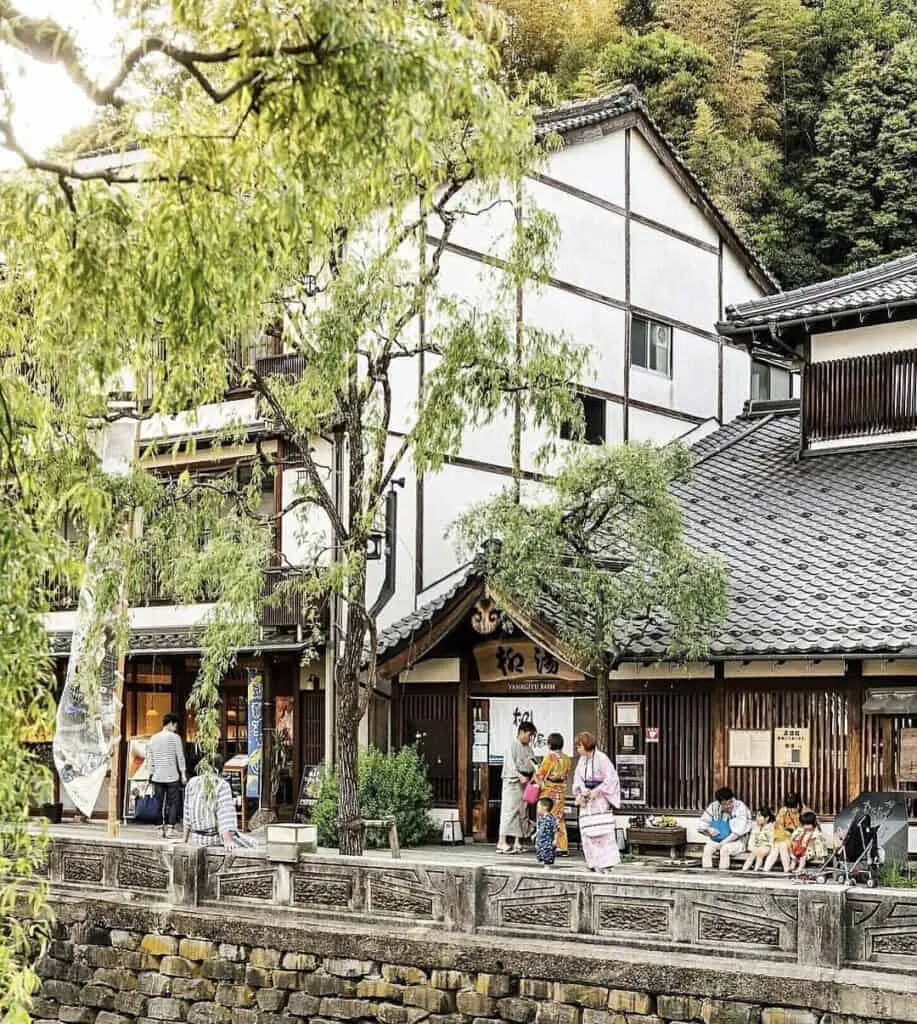
Onsen towns are wonderful village resorts known for their public baths. If you want to skip the hassle of finding a tattoo-friendly onsen, then you should book a trip to Kinosaki Onsen!
This is a 1300-year-old hot spring that’s known for its seven different public bathhouses. This picturesque village is located about 93 miles north of Kyoto, along the north coast of the Tajima region.
If you make the trip here then you will be rewarded with seven public bathhouses that are tattoo-friendly. The social stigma around tattoos usually means that finding somewhere that will let you in can be tricky. However, at Kinosaki Onsen you will face no such barrier.
All seven bathhouses accept people with tattoos, so you can remove the risk of being refused entry completely. This is because Kinosaki is a tourist village, they are very used to tourists, including their tattoos.
This is the perfect place to visit if you want a taste of ’old Japan.’ If Kinosaki onsen is too far away to add to your travel itinerary then worry not, there are plenty more places you can visit with tattoos.
The Hoshino Resort made waves when they announced that people with tattoos would be permitted to use their high-end onsen. These 13 resorts known as Kai would accept visitors with small tattoos as long as they could be covered by an 8 x 10 cm sticker. This was a headline-worthy announcement in 2015 that’s furthered inclusion throughout Japan.
List of Tattoo-Friendly Onsen
So that you can plan your trip through Japan carefully, here is a list of known onsen that permits access to people with tattoos.
Of course, you can always contact any onsen to find out their stance, especially if there is one you want to visit but it isn’t listed below. This is by no means an exhaustive list, but I have tried to get a good spread across the country. So hopefully there will be somewhere listed nearby where you are visiting.
Jakotsu-yu: located in Tokyo, this is a popular onsen among locals and tourists. Famous for its massive tiled mural of Mount Fuji.
Takaragawa Onsen: located in Gunma, this onsen offers an open-air mixed-gender experience that overlooks a beautiful scenic review. There are also vending machines with beer, so yeah, worth a visit.
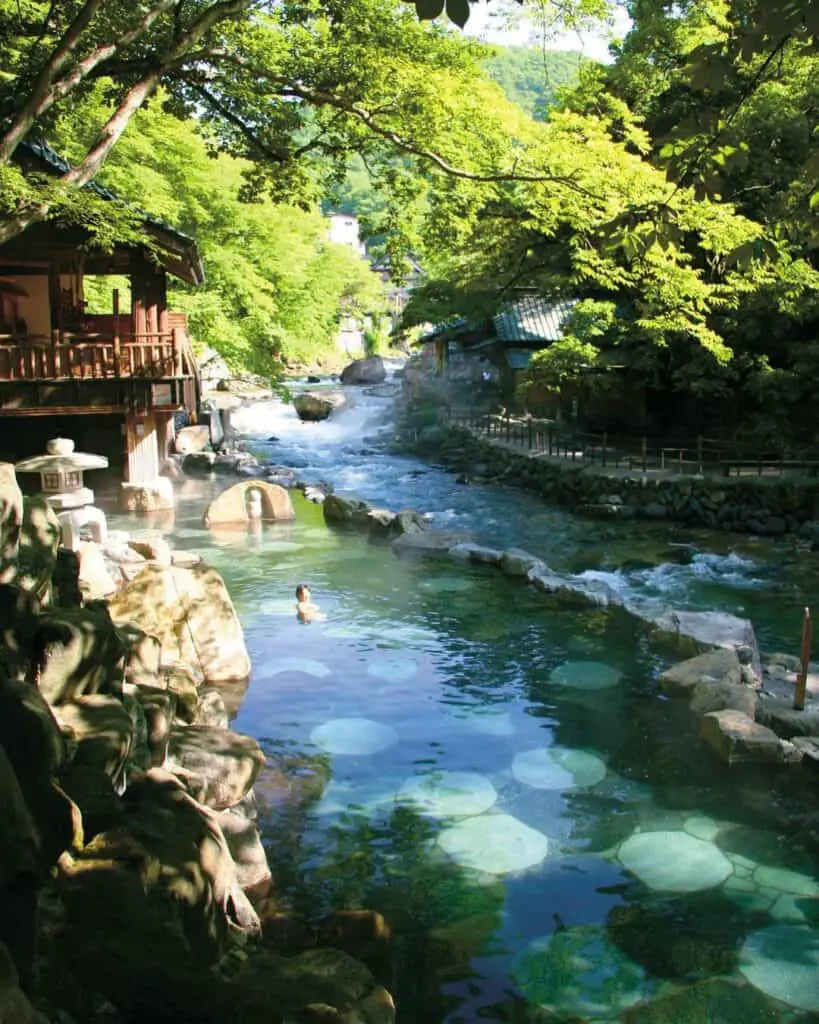
Hoheikyo Onsen: located in the suburbs of Sapporo. This is a popular tourist destination famous for both it’s open-air baths and it’s delectable Indian curries.
Kin-no-yu Onsen: located in the onsen then Arima, Kobe. This is the oldest public bath in the village.
Fukiage Onsen: located in Kamifurano, this town is popular among skiers. You can pair relaxing bathing with exhilarating outdoor snow sports.
Yamato-no-yu: located in Chiba. The perfect place to relax with both indoor and outdoor baths
Tsukiori Onsen Takimi-no-yu: located in Ibaraki. All tattoo sizes are permitted here, and it’s located close to the HitachiSeaside Park
Uramigataki Onsen: located on the Izu Islands, Tokyo. Tattooed people are welcome here, and it’s also free. It’s a little out of the way and you can only reach it by ferry or plane but the trip will be well worth it.
Tenzan Tohji-Kyo: located in Hakone, Kanagawa. This is one of the most famous onsen towns in Japan. Larger tattoos might not be accepted here, but you will have the option of hiring a private bath.
Tsubame Onsen: located in Niigata. Truly a wonderful place, this onsen sits at the base of Mount Myoko in a secluded forest. Tattoos are welcome at both it’s two outdoor baths.
Funaoka Onsen: located in Kyoto. This onsen is perfect after a long day of hiking. There is a low-level electric current running through the water which is supposed to soothe sore muscles.
Kaimonji Onsen: located in Beppu City. A popular spot among travelers, this onsen is remarkably cheap at just 100 yen per person.
Yuya Ebisu: located in Oita. This is a public bath as part of Ebisuya Ryokan overlooking Beppu Bay.
Sansui Global Inn: located in Saga. This onsen is considered one of the best onsen in Japan. It has both private and public available for use.
Dogo Onsen: located in Ehime. This onsen was actually one of the inspirations for the bathhouses in Studio Ghibli’s award-winning film Spirited Away.
Hottarakashi no Onsen: located in Yamanashi. This onsen has spectacular views of Mount Fuji. You can even bathe here after dark with the sky full of stars.
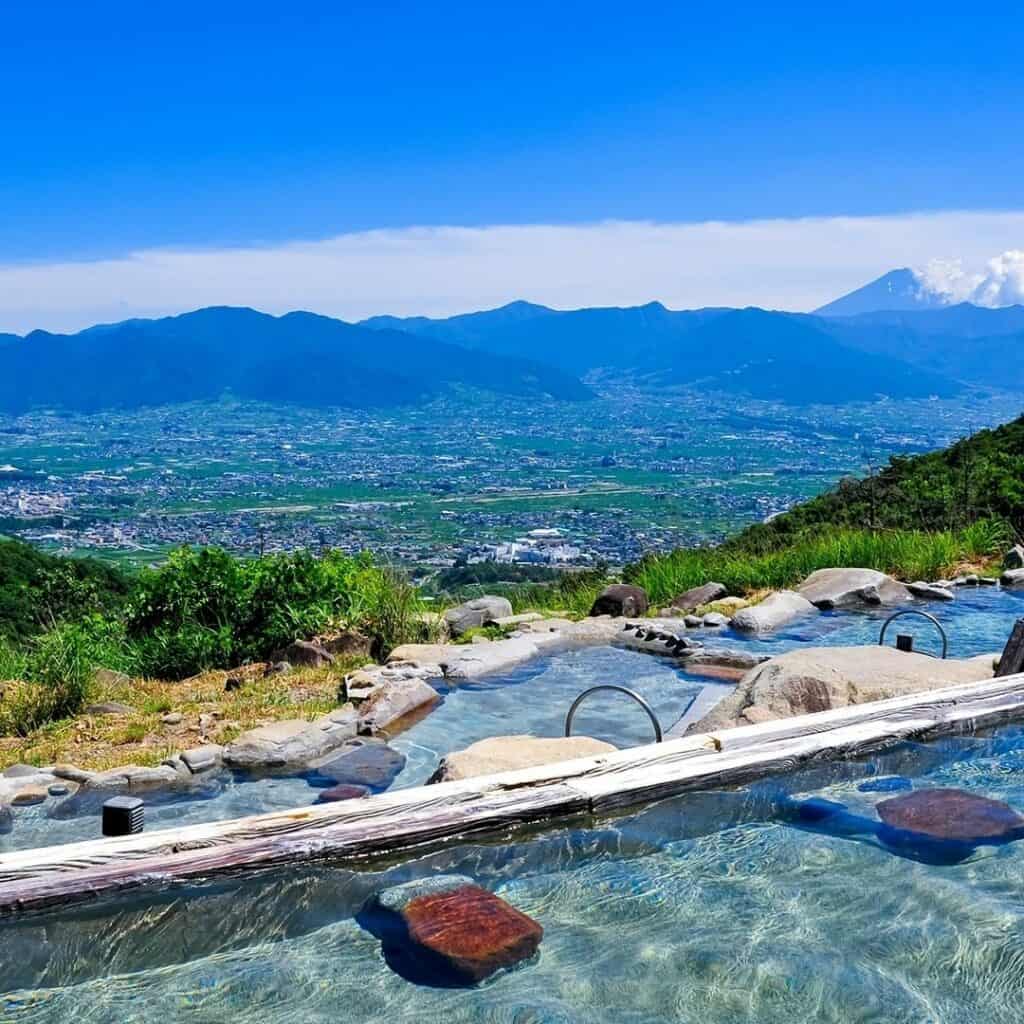
There is just a small selection of onsen that you can visit with tattoos. There is over 2300 onsen throughout Japan all with different rules. If you aren’t sure about where the onsen stands with regards to tattoos the best thing you can do is phone ahead and ask.
The Japanese Tourism Agency reported that just under one-third of onsen were tattoo-friendly in 2015. So there are many more not listed here that will also allow tattoos.
More Onsen Rules
Tattoos are just one thing to be mindful of while visiting an onsen. Even if you have no tattoos, or are covered up, there is more etiquette you need to be clued up on.
When you visit an onsen you are supposed to strip down. Aside from the small covering, you might wear over your tattoo, you shouldn’t be wearing anything else. If you are anxious about being naked, you can hold a small onsen towel to cover your privates while walking along the edge.
An onsen bath is not intended to clean you. Its purpose is for relaxing, to that end you should clean yourself with the showers provided before entering the bathtub.
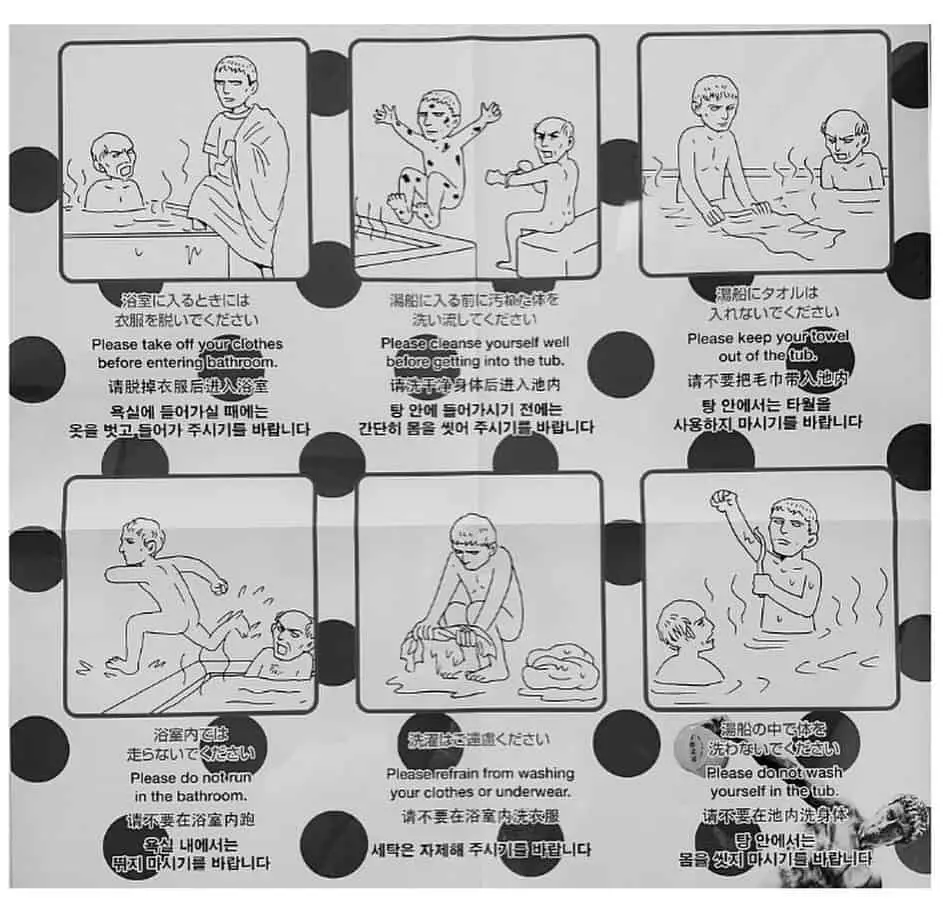
Other guests will be using the onsen and you should conduct yourself accordingly. No running, as the floor can become very slippery. Once in the onsen, even if it is a large tub, there’s no swimming.
You’re supposed to relax and unwind in an onsen, not get your daily exercise in. Children splashing around will be tolerated as long as it is not disruptive or excessive.
Do not get drunk and then use an onsen, it’s impolite and not at all safe. Likewise do not bring glass into an onsen, or the locker room.
Do not submerge your towel in the water. This is unhygienic and you should avoid letting your towel or soap get into the bathtub.
Similarly, you should avoid letting your hair touch the water. So if you have long hair, consider putting it in a hair and or wrapping it in a towel. Nobody should be putting their head underwater as shared water can carry some risk of infection.
It’s just about being courteous of the other guests more than anything. After all, just because you have a tattoo, does not mean you’re a member of the yakuza. So you should act with decorum during your time at an onsen.
Visiting Japan with Tattoos
I’d understand if you’ve read about the stigma surrounding tattoos and felt less inspired to visit. However, times are changing and more and more places are becoming hospitable to foreigners with tattoos. There is still work to be done before tattoos can be considered inclusive.
Tattoos and their links to the yakuza have been causing concern among establishments in Japan. However, as a foreigner visiting the country you are unlikely to be confused with a member of the mafia. If your tattoos are covered by your clothes then you won’t find much hassle anywhere.
You are most likely to find issues where you are more likely to expose your body. This is why tattoos are such a cause for concern at the onsen. There are, however, other places you should know about as well.
Pools and gyms, like onsen, may turn you away if you have exposed tattoos. If your tattoos can be covered, then you should be fine. When visiting these types of establishments keep an eye out for signs that suggest tattoos are banned.
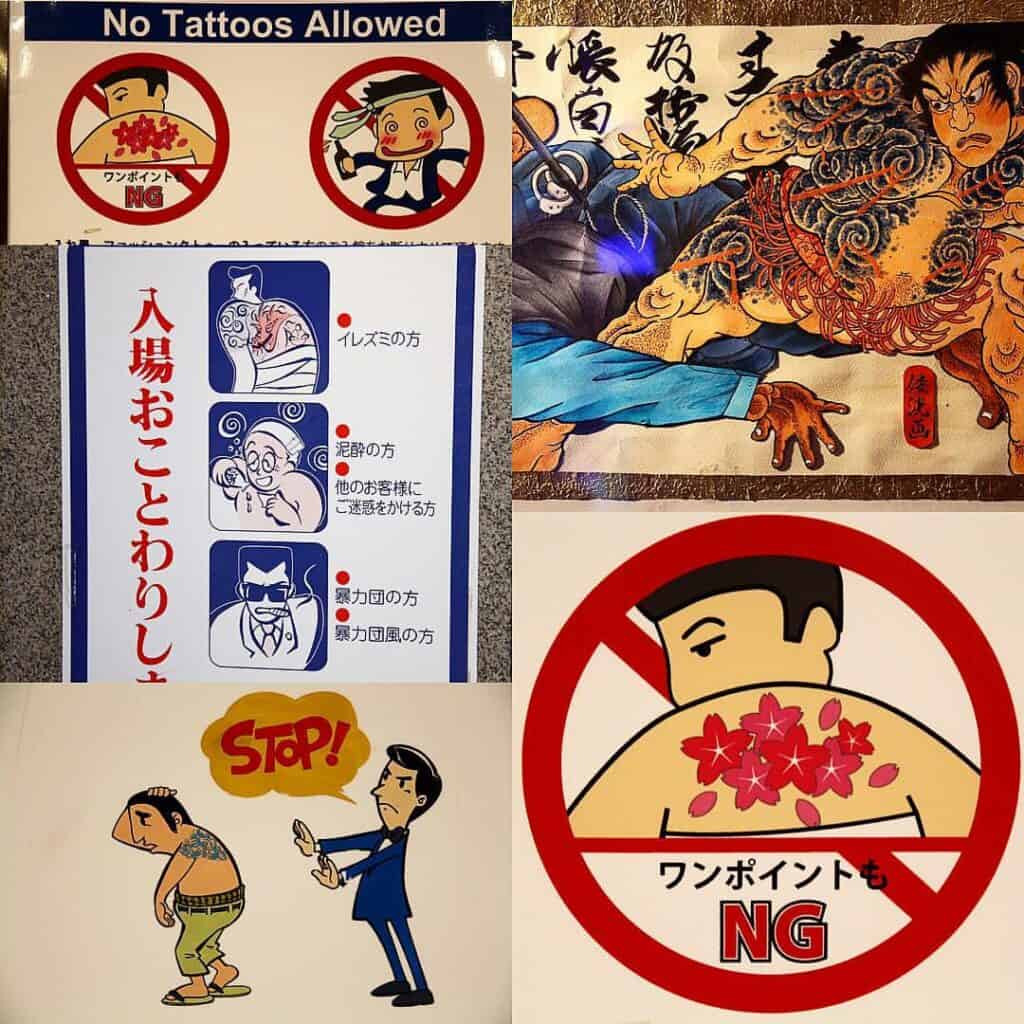
Similarly, sento (community bathhouses) will not permit entry to people with tattoos. It might be a case of being asked to cover up or perhaps being asked to leave.
Some ryokans will turn you away if you have tattoos on display. It’s best to clarify before you arrive what their policy on tattoos is. After all, Japan is a polite society and confrontation is to be avoided where possible.
Even after you have been permitted to stay at the ryokan, the workers would likely appreciate it if your tattoos could be concealed in communal areas.
When visiting a shrine or a temple it is considered a sign of respect to cover up your tattoos. It’s unlikely you would see signs expressly forbidding tattoos but it would be greatly appreciated by the locals.
While traveling around in public places you’re unlikely to upset anyone if your tattoos are on display. The main places to consider are more traditional environments. As well as that, it’s the slightly more intimate environments like the onsen that you should be mindful of.
It’s worth planning ahead to avoid any unnecessary confrontation. If you call and ask, proprietors will be happy to let you know their policy and work with you if they can.
Ways to Cover Your Tattoos
The easiest and most obvious way is to wear clothes that will fully cover the tattoo. This ensures that no one will become offended and no eyebrows will be raised.
However, if you’re keen to take a dip in the hot spring then alternative methods will be needed. The next best thing would be to book a private onsen, that way no one else will be around and there’s no one to hide your ink from. It sorts out the problem before it even becomes one.
If you are going to end up in a public bath and want to try to cover up your tattoo, then use the skin cover the onsen provides. Although not every bathhouse will have these, instead you could use appropriate sized plasters.
No one’s going to look twice at a plaster, or at bandages. Since the issue is about your tattoo being visible, this takes away the visibility and should therefore be acceptable.
You might be able to get away with concealing a tattoo with a towel and then it might not be visibly underwater. Such as a back tattoo, no one will be able to see if you are perched against the wall. This might be considered disrespectful if you try to deceive the workers, however.
The best thing you can do is research where will accept tattoos and just go there. There is plenty of onsens that operate with tourists in mind, like Kinosaki Onsen. Rather than creating an uncomfortable atmosphere somewhere.
Keep in mind that this unfavorable stigma against tattoos has less to do with foreigners and more to do with Japan’s own history. It is unlikely you will come across anyone that would claim you’re a member of the yakuza. Some establishments worry that if they lift the ban on tattoos for foreigners it could lead to unsavory gang members using their facilities
If you have tattoos and want to visit Japan you should feel empowered to do so. As time goes on the rules around tattoos will surely be relaxed. You will still be able to have a fulfilling and wonderful time during your visit.
It’s just important to remember to plan and do your research before accidentally causing offense where none was meant.


